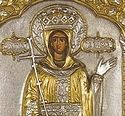

| Previous day | Next day |
| Old Style
September 11
|
Tuesday |
New Style
September 24
|
| 15th Week after Pentecost. Tone 5. | No fast.
|
![]() St. Theodora of Alexandria (490).
St. Theodora of Alexandria (490). ![]() Translation of the relics of Sts. Sergius and Herman of Valaam (1542-1550).
Translation of the relics of Sts. Sergius and Herman of Valaam (1542-1550). ![]() St. Silouan, elder, of St. Panteleimon Monastery, Mt. Athos (1938).
St. Silouan, elder, of St. Panteleimon Monastery, Mt. Athos (1938).
Martyrs Demetrius, his wife Evanthia, and their son Demetrian, at Skepsis on the Hellespont (1st c.). Martyr Ia of Persia and 9,000 martyrs with her (362-364). St. Euphrosynus the Cook, of Alexandria (9th c.). Martyrs Diodorus, Didymus, and Diomedes, of Laodicea (362-364). Glorification of St. Xenia of St. Petersburg, fool-for-Christ (1978). St. John, abbot, of Svyatogorsk Monastery (1970). Synaxis of the Saints of the Svatogorsk Monastery.
Weeping Kazan Icon of the Most Holy Theotokos “Of Kaplunovka.” (1689)
Martyrs Serapion, Cronides, and Leontius, of Alexandria (237). St. Paphnutius the Confessor, bishop in the Egyptian Thebaid (4th c.). St. Deiniol, abbot and bishop, of Bangor, Wales (584). Holy Martyr Theodora of Vasta in the Peloponnese. St. Elias the Cave-dweller, of Calabria (ca. 960).
Repose of the young Elder Melchizedek of Mzensk (1846).
Thoughts for Each Day of the Year
According to the Daily Church Readings from the Word of God
By St. Theophan the Recluse

Tuesday. [Gal. 2:21-3:7; Mark 6:1-7]
From whence hath this man these things? and what wisdom is this which is given unto him? Thus spoke the people of Nazareth about the Lord, having known His former life of low estate. The same happens with everyone who truly follows the Lord. He who strictly holds to the path of the Lord changes completely once he has labored to overcome all that is not right within himself. His whole constitution—his gaze, walk, speech, and behaviour all bear the mark of particular harmony and dignity, though he may have come from a lowly background, and has no education. It is then heard, “From whence hath this man these things?” If things that are bodily and visible are so transformed, what can be said of the inner things, of the soul, which are more directly and closely subject to the action of transforming grace, and to which the externals serve only as an expression and consequence? How bright, exact and determined are his thoughts about everything! How true is his judgment about what exists and occurs! His viewpoint on everything is higher than that of philosophers! And his intentions, actions and undertakings? All is pure, holy, reflecting heavenly brightness. In truth, this is a new person! He has not received an education, has not heard lectures in universities, and has no [illustrious] upbringing at all, and yet he is most well-mannered and wise. Attentiveness toward oneself, labour over oneself, prayer and drawing near to God refashioned everything through God’s grace; and nobody saw how it happened. That is why the question arises, “From whence hath this man these things?”
Articles
 Venerable Sergius the Wonderworker of ValaamSaints Sergius and Herman settled on the island of Valaam in 1329. |
 Venerable Herman the Wonderworker of ValaamSaints Sergius and Herman settled on the island of Valaam in 1329. The brethren gathered by them spread the light of Orthodoxy in this frontier land. |
 St. Euphrosynus the Cook, of AlexandriaSaint Euphrosynus the Cook was from one of the Palestinian monasteries, and his obedience was to work in the kitchen as a cook. |
 Holy Hierarch Deiniol, Bishop of Bangor in WalesDmitry LapaSt. Deiniol (the Welsh from of Daniel) lived in the sixth century. He was a descendant of one Celtic ruler in Northern Britain. |








